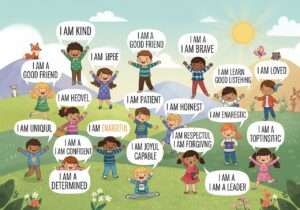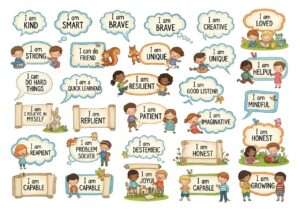Positive self-talk isn’t just for adults—it can have a powerful impact on children too. That’s where affirmations for kids come in.
These simple, uplifting statements help build a strong foundation of confidence, self-love, and resilience, all while nurturing a child’s emotional well-being.
Whether you’re a parent, teacher, or caregiver, introducing affirmations into a child’s daily routine can set them up for lifelong success.
In this post, we’ll explore what affirmations are, why they matter, how to use them with kids, and provide a list of age-appropriate affirmations you can start using today.
Related Post: Motivational Quotes for Kids
What Are Affirmations for Kids?

Affirmations are short, positive statements that are repeated regularly to encourage a healthy mindset and emotional growth.
When kids say affirmations out loud or repeat them silently, they begin to internalize those positive messages.
Over time, affirmations can help reshape how children view themselves and the world around them.
For example:
-
“I am brave.”
-
“I can do hard things.”
-
“I am kind and helpful.”
These messages help counter negative thoughts, reduce self-doubt, and increase emotional resilience.
Why Are Affirmations Important for Children?
Children are constantly learning—not just academics, but also how to manage emotions, relationships, and self-perception.
Here’s how affirmations support their development:
1. Boosts Self-Esteem
Positive affirmations remind kids that they are capable, valued, and loved. This builds their self-worth, especially during stages where they may feel unsure or insecure.
2. Encourages Growth Mindset
Affirmations help children understand that challenges are opportunities to grow. Instead of saying “I can’t do this,” they learn to say, “I will keep trying.”
3. Reduces Anxiety and Stress
Repeating calming affirmations can help kids feel more in control of their emotions, especially during moments of fear or frustration.
4. Improves Focus and Behavior
Affirmations can help children stay grounded, improve focus during school, and encourage positive interactions with others.
How to Teach Kids to Use Affirmations
You don’t need a fancy routine—just consistency and encouragement. Here are simple ways to introduce affirmations for kids into their day:
-
Morning Ritual: Start the day with a positive affirmation during breakfast or while brushing teeth.
-
Mirror Practice: Have your child look in the mirror and say an affirmation out loud.
-
Affirmation Cards: Create colorful cards with different affirmations and rotate them weekly.
-
Bedtime Routine: Repeat affirmations before sleep to end the day on a positive note.
-
Craft Activity: Let kids draw pictures of how an affirmation makes them feel.
Make it fun, age-appropriate, and meaningful. Encourage your child to come up with their own affirmations, too.
30 Powerful Affirmations for Kids

Here are some simple, effective affirmations to get you started:
-
I am loved.
-
I am smart and creative.
-
I am enough just as I am.
-
I am a good friend.
-
I believe in myself.
-
I can ask for help when I need it.
-
I make good choices.
-
I am brave, even when things are hard.
-
I am kind to others and to myself.
-
I am learning every day.
-
I am proud of who I am.
-
I listen to my feelings.
-
I am strong inside and out.
-
I can do anything I set my mind to.
-
I am unique and special.
-
I am calm and in control.
-
I care about people.
-
I try my best every day.
-
I forgive myself when I make mistakes.
-
I am important.
-
I spread joy wherever I go.
-
I am a great listener.
-
I love to learn new things.
-
I can turn my dreams into goals.
-
I choose to think positively.
-
I trust myself.
-
I am full of potential.
-
I can be a leader.
-
I am grateful for today.
-
I make the world better just by being me.
Final Thoughts: Let Kids Soak in the Positivity
Affirmations for kids aren’t just trendy phrases—they’re powerful tools to help young minds flourish.
Whether your child is dealing with peer pressure, academic stress, or just the ups and downs of growing up, affirmations offer a steady reminder of their inner strength and value.
Start small, stay consistent, and watch how positive words can help shape confident, compassionate, and self-aware children.
Affiliate Disclosure: As an Amazon Associate, I earn from qualifying purchases. This post may contain affiliate links. This means I may earn a small commission at no extra cost to you.



